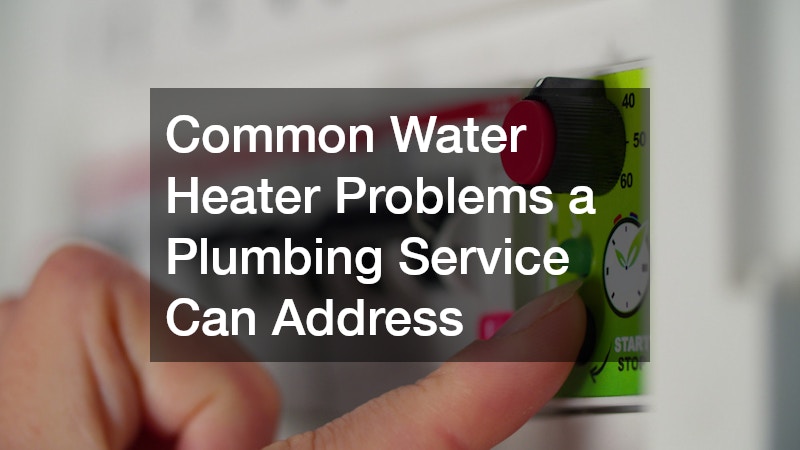It’s important to understand common water heater problems that homeowners may encounter and how a plumbing service can assist in resolving these issues. With routine maintenance and attention, many issues can be prevented or minimized. Understanding your water heater’s functionality can lead to better care and timely interventions.
Exhibiting Signs of Failure
One of the most apparent signs of a failing water heater is inconsistent water temperatures. Homeowners might notice their hot water running out unexpectedly or fluctuating between hot and cold. This inconsistency can be quite frustrating, indicating that something is wrong within the unit.
Another common sign is the presence of strange noises coming from the water heater. Sounds like popping, rumbling, or hissing can suggest sediment buildup in the tank, which can impede efficiency. Homeowners should remain vigilant about these noises as they may point to larger problems developing within the heater.
Lastly, leaks are a significant indicator of a failing water heater. Musty odors or water pooling around the base of the heater can signal serious issues. Early detection of leaks can prevent further damage to the home and help avert costly repairs.
Making Strange Noises
Strange noises from a water heater can indicate several issues, with sediment buildup being one of the most common causes. Over time, minerals from the water can accumulate at the bottom of the tank, leading to rumbling or popping noises. This sediment can negatively impact heating efficiency and, if left untreated, may cause more severe damage.
Another possibility is that the heating elements within the water heater are malfunctioning. If a component is failing or working erratically, it can produce unusual noises during operation. Homeowners should consider contacting a plumbing service when unusual sounds persist for an extended period.
Furthermore, improper installation can lead to strange noises as well. If the water heater is not level or is installed in a way that causes vibration, it may produce odd sounds during operation. Consulting a professional plumber can help resolve installation-related issues and restore peace to the home.
Leaking Water Heater
Detecting a leak may involve noticing water pooling around the base of the unit. Any standing water near the heater should be checked carefully. If left unchecked, even small leaks can cause significant water damage and potentially mold growth in the surrounding area.
Visible corrosion on pipes and the tank’s exterior can also indicate a leak. Rust buildup is a telltale sign that the water heater is deteriorating, which could lead to leaks. Homeowners should regularly inspect their water heaters for signs of rust to catch potential issues early.
Lastly, an increase in water bills can signal hidden leaks within the system. If a homeowner notices a sudden rise in their water usage without a reason, it could be due to a concealed leak in the tank. Promptly addressing these indicators with a plumbing service can save time and money.
Running Out of Hot Water
If homeowners find themselves running out of hot water faster than they expect, several factors could be at play. One common cause is the size of the water heater. If the unit is too small for the household’s usage, it may not supply adequate hot water for everyone’s needs.
Another reason could be sediment buildup inside the tank. When sediment collects, it can reduce the efficient heating of the water, causing the heater to work harder but eventually run out of hot water sooner than anticipated. Regular maintenance to flush the tank can mitigate this issue.
Lastly, defective heating elements might be responsible for the problem. If one of the heating elements is malfunctioning, it will not heat the water as efficiently, leading to insufficient hot water. A plumbing professional can conduct assessments and repairs to restore optimal performance.
Improving Heater Efficiency
Routine maintenance is essential for keeping a water heater functioning efficiently. Regular inspections by a plumbing service can identify potential problems before they escalate. Homeowners should schedule yearly check-ups to ensure their unit remains in good condition.
Another effective method is periodic flushing of the water heater to remove sediment buildup. This task helps to restore the efficiency of the heating elements and prolong the lifespan of the unit. Homeowners can consult professionals for advice on how often this should be performed based on their water quality.
Lastly, proper insulation of the water heater and the pipes can significantly improve energy efficiency. Insulating the tank and associated pipes minimizes heat loss and can lead to reduced energy bills. Homeowners should consult with plumbing experts about suitable insulation options to maximize their water heater’s efficiency.
By understanding these common water heater problems and seeking professional help, homeowners can ensure their hot water systems operate efficiently and effectively. A proactive approach can lead to less downtime and more comfort in daily routines. Remember, timely interventions and regular maintenance are key to extending the life of your water heater.

